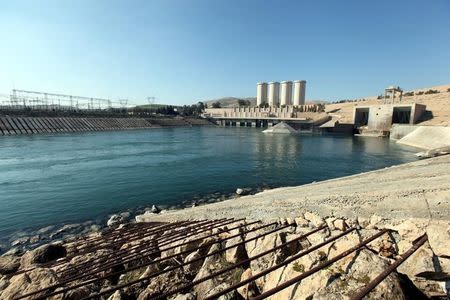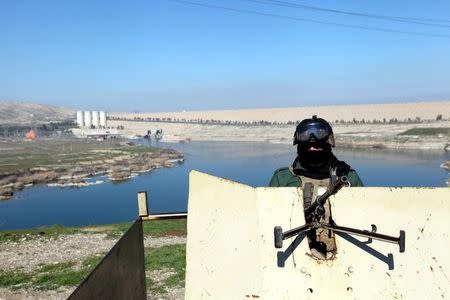Obama intervened over crumbling Iraqi dam as U.S. concern grew
By Warren Strobel, Jonathan Landay and Phil Stewart WASHINGTON (Reuters) - On Jan. 21, U.S. Secretary of State John Kerry met with Iraq's prime minister in Davos, Switzerland, and handed him a personal note from President Barack Obama pleading for urgent action. Obama's confidential message to Haider al-Abadi, which was confirmed to Reuters by two U.S. officials and has not been previously reported, was not about Islamic State or Iraq's sectarian divide. It was about a potential catastrophe posed by the dire state of the country's largest dam, whose collapse could unleash a flood killing tens of thousands of people and trigger an environmental disaster. The president's personal intervention indicates how the fragile Mosul Dam has moved to the forefront of U.S. concerns over Iraq, reflecting fears its failure would also undermine U.S. efforts to stabilize Abadi's government and complicate the war against Islamic State. It also reflected growing frustration. The U.S. government felt Baghdad was failing to take the threat seriously enough, according to interviews with officials at the State Department, Pentagon, U.S. Agency for International Development (USAID) and other agencies. "They dragged their feet on this," said a U.S. official, who like the other sources declined to be identified. (Maps showing expected flooding impact of dam break on Mosul and Baghdad: http://tmsnrt.rs/1SdaVRm http://tmsnrt.rs/1SdaDKp) The Iraqi government declined official comment on those assertions and on the Obama letter. A U.S. government briefing paper released in late February says that the 500,000 to 1.47 million Iraqis living in the highest-risk areas along the Tigris River "probably would not survive" the flood's impact unless they evacuated. Swept hundreds of miles along in the waters would be unexploded ordnance, chemicals, bodies and buildings. "Governance and rule of law (would be) disrupted by widespread human, material, economic, and environmental losses," says the paper. U.S. officials would not disclose the precise contents of Obama's letter. Its impact on Iraq's government could not be confirmed. But 11 days after it was delivered, Iraqi Minister of Water Resources Muhsin al-Shammari's own political party removed him from responsibility over the dam, according to public statements. The water minister has publicly downplayed the threat posed by the dam. U.S. relations with al-Shammari, an ally of anti-American cleric Moqtada al-Sadr, had become so bad that when U.S. Ambassador to Iraq Stuart Jones came to meetings, the minister would walk out, said an Iraqi government source briefed on Mosul Dam planning. A U.S. embassy official in Baghdad confirmed that al-Shammari would not attend meetings with Jones. In one instance, U.S. officials were told that al-Shammari sat in an adjoining room and listened to a meeting via an audio feed. But cooperation with Abadi has been smooth, the official said. Al-Shammari has not commented publicly on those meetings. He has suggested that predictions about the dam are an excuse to send more foreign troops to the country. On March 2, Iraq signed a $296 million contract with Italy's Trevi Group to reinforce the dam in northern Iraq, which has needed that work since it was built in the early 1980s on veins of water-soluble gypsum. Italy has said it will send 450 troops to help protect the dam. ALARMING STUDY Obama's decision to send the note was prompted in part by alarming U.S. intelligence reports and a new U.S. Army Corps of Engineers study that found that the dam is even more unstable than believed, U.S. officials said. Paul Salem, vice president of the Middle East Institute, a Washington think tank, said that if the dam fails, the ensuing chaos and damage could trigger the collapse of U.S. ally Abadi's government and tarnish Obama's international legacy. Efforts to repair the dam -- which lies about 30 miles (48 km) northwest of the city of Mosul -- have been handicapped by Iraq's chaotic security situation; political divisions in Baghdad; years of previous warnings that did not come true; and a cultural divide, U.S. and Iraqi officials and analysts said. U.S. officials said Abadi, who is also grappling with the war against Islamic State, political infighting and budget shortfalls caused by low oil prices, is now focused on the dam and overseeing efforts to repair it. "We've gotten to a point where there's no question (the Iraqis) are on board," said a senior USAID official. However, Trevi says it will take four months to prepare the work site. And the 2.2 mile (3.5 km)-long hydroelectric dam faces its highest risk between April and June from rising water levels due to melting snow. Grout to reinforce the dam must be trucked in from Turkey, officials said, because the previous factory is in Mosul, now controlled by Islamic State militants. "SWISS CHEESE" Some Iraqi officials said Washington is sounding loud alarms over the dam to absolve itself of responsibility. The United States, which invaded Iraq in 2003, could have sought a more permanent solution before its 2011 pullout of combat troops but merely kept the dam operating at minimum cost, they contend. There is no sign that a breach of Mosul Dam is imminent. But the structure was built on what the senior USAID official called "the geologic equivalent of Swiss cheese." The 45-foot (14-meter) high wall of water that would swamp Mosul city within four hours of a dam breach would be "roughly what hit Japan during the height of the tsunami" in 2011, he said. Maintenance was suspended after Islamic State seized the dam for two weeks in August 2014, scattering workers and destroying equipment. Work has resumed in recent months but officials have said international expertise is needed to prevent collapse. While the full U.S. Army Corps of Engineers report hasn't been released, slides summarizing its conclusions and dated Jan. 30, were posted on the Iraqi parliament's website last month. "All information gathered in the last year indicates Mosul Dam is at a significantly higher risk of failure than originally understood and is at a higher risk of failure today than it was a year ago," says one slide. A senior Iraqi official, speaking on condition of anonymity, said this U.S. assessment helped drive the decision to finalize the contract with Trevi group after months of talks. Richard Coffman, a University of Arkansas assistant professor of civil engineering, studied satellite radar imagery and found the dam was sinking by eight millimeters a year. Resuming grout-pumping operations is only a temporary solution, he said. "There is a need for a long-term fix." (Additional reporting by Stephen Kalin and Maher CHmaytelli in Baghdad and Steve Scherer in Rome. Editing by Don Durfee and Stuart Grudgings)



